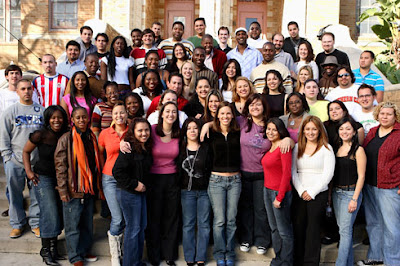This is yet another movie that touched my soul. Just last month I watched The Ron Clark Story which Monu sent me, and here is another one shaping the teacher in me. The Free Writers is a 2007 American Drama adapted from the best selling book The Freedom Writers Diaries (1999) by the teacher in the story herself, Erin Gruwell.
 |
| The Real Ms Erin Gruwell- The Teacher, The Writer |
She takes up the job of teaching English on Long Island at 23. She is put into a class, which is almost a war zone where children nearly of her age and a lot bigger than her size are divided by racial hatred. These children walk with guns in the pockets and bitterness in their hearts, looking for any chance to start a fight. They come from a community that is divided into gangs and has a bloody history.
| The Freedom Writers Diary (The Book) How a Teacher and 150 Teens Used Writing to Change Themselves and the World Around Them is a non-fiction 1999 book written by The Freedom Writers, a group of students from ...Wikipedia Published: 1999 Author: Erin Gruwell Original language: English Genre: Non-fiction Adaptations: Freedom Writers Freedom Writers (The Movie) Freedom Writers is a 2007 American drama film starring Academy Award winner Hilary Swank, Scott Glenn, Imelda Staunton and Patrick Dempsey. Wikipedia Release date: January 5, 2007 (initial release) Director: Richard LaGravenese Screenplay: Richard LaGravenese Story by: Erin Gruwell, Freedom Writers Producers: Michael Shamberg, Stacey Sher, Danny DeVito |
Our problems are nothing compared to what Ms Gruwell faces, she teaches in a classroom filled with resentments, where every careless word every minute starts up a fight. Her initial efforts to unite the divided class ends up making herself another enemy for them. The turning point in the story is a cartoon of a thick-lipped black boy passed around in the classroom that catches the attention of Ms Gruwell. Deeply saddened by the racism in the classroom she relates that cartoon with the cartoons of big-nosed Jews drawn by the biggest gang ever. She tells them about how that gang hated other races and divided countries and how that ended up in holocaust, taking away the lives of 6 million Jews.
Surprisingly, except for one, none in the huge class ever heard of the Holocaust. Ms Gruwell then goes looking for reading materials but the school denies her any book. She takes up two other part-time jobs to afford Diary of Ann Frank for her students, but in her personal life, her extra involvement with her class costs her own marriage.
The book does magic to her children, each could relate their lives to that of Anne Frank and the story made them realize how much hatred could destroy. Ms Gruwell takes her kids to the Holocaust Museum to see what Nazi and their hatred for Jews has done. She further invites Miep Gies, the lady who hid Ann Frank in her attic, to talk to her students. Lady Miep Gies shares about how she did what was right and she tells the kids that anybody can do what she has done, therefore everybody is a hero.
Ms Gruwell gives every child a notebook to start their own diary and every child writes about their lives, which is later compiled into a book by Ms Gruwell and calls it The Freedom Writers Diaries. This connected me so much to the movies because besides being a teacher I also love writing my diary. And you are reading my freedom diary.
 |
| The Real Freedom Writers |
A lesson to teachers in Bhutan: We all begin our teaching lives at about the same age as Ms Erin Gruwell but we are lucky to walk in any classroom and have our students standing up in respect. She faces cynicism for her passion, she is denied of support, her successes are criticized and she is deprived of basic resources like library books, yet nothing stops her, then why should anything stop us?
 |
| Anne Frank, The book I am reading next! |
Dechen blogs @ Dechen's: The World I Know, My Small World




